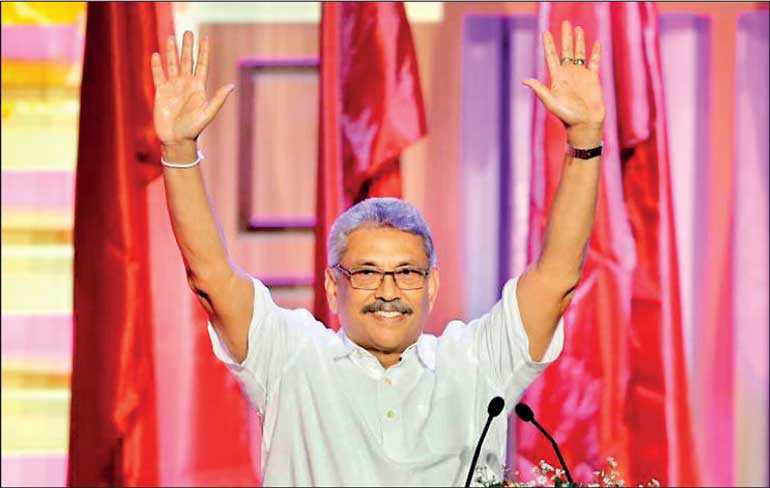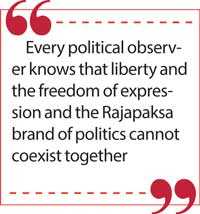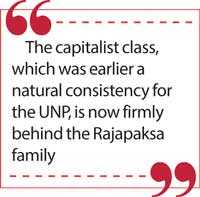Tuesday Feb 24, 2026
Tuesday Feb 24, 2026
Friday, 8 November 2019 00:00 - - {{hitsCtrl.values.hits}}

By Ashoka Mihindu
Gotabaya Rajapaksa, much like US President Donald Trump, has no previous experience in political office. The Easter Sunday attack has made him the front-runner to presidency, as citizens have become terror-weary.
Recently, former Minister Milinda Moragoda said that presidential candidates should be watchful about their close associates. He pointed out that the influence of allies and friends brings the downfall of most leaders. It is pertinent to critically examine the agendas of various interest groups that ardently champion Gotabaya.
The support of capitalists
Unlike developed countries such as the US, Sri Lanka does not have a patriotic, progressive-minded capitalist class. Deplorably, the nation’s elite, professionals, and the business community suffer from a severe lack of empathy. The above-mentioned groups have a scant regard for the freedom of expression, human rights, democracy, and the independence of judiciary.
The US is blessed to have capitalists like Bill Gates and Warren Buffet who are philanthropic, admirable, and large-hearted. Both these billionaires hold the view that they must pay more taxes and they are not taxed enough (www.cnbc.com/2019/02/25/warren-buffett-and-bill-gates-the-rich-should-pay-higher-taxes).
Contrast this with the attitude of billionaires in Sri Lanka. During the Fireside Chat 2018, which was moderated by this newspaper’s editor, Sumal Perera lamented about his company Access Engineering having to pay more taxes subsequent to the corporate income tax rate hike by the Government.
However, even after such tax increases, his company remains highly profitable. At the same forum, another business magnate said Sri Lanka needed a dictator. Human rights, personal and civil liberties, and media freedom take a severe beating under dictators. Such a style of governance is inconsistent with today’s world order which is based on respect for democracy and human rights.
Following such oppressive policies would put our country at the risk of being imposed sanctions by the West similar to Robert Mugabe’s Zimbabwe. Do we want to risk such an unfortunate outcome and  endanger our economy’s potential? Those who say we need a dictator for economic development must definitely wake up from their pathetic ignorance.
endanger our economy’s potential? Those who say we need a dictator for economic development must definitely wake up from their pathetic ignorance.
The capitalist class, which was earlier a natural consistency for the UNP, is now firmly behind the Rajapaksa family. Gotabaya in his manifesto has already said that he would bring down the corporate income tax rate to 18% from the existing 28%.
Can we afford to have a Singaporean-style corporate income tax rate while providing Scandinavian-type social welfare? The Government has to provide universal healthcare and universal education while offering a plethora of goodies. All of us know that our country has a huge unpaid debt burden which needs to be overcome. In such a context, don’t these risky tax cuts threaten our fiscal discipline?
Nevertheless, our parochial business community would be infatuated with this pledge. Low corporate taxes are not a guarantee for economic prosperity. During the years of Bill Clinton’s presidency, the US enjoyed an unprecedented level of economic expansion in spite of hiking the corporate tax rate to 35%. Most of Gotabaya’s advisers are not economists but oligarchs and accountants who have vested interests. This capitalist class who are passionately supporting the Rajapaksa family must recall that in 2011, under a draconian piece of legislation, the private enterprises of Daya Gamage and Harry Jayawardena were taken over by the Rajapaksa Government giving flimsy reasons. Does the business community of this country dream for a political regime which does not value private property rights?
Stockbroker mafia
There was a section of stockbrokers which was so powerful under the previous Rajapaksa regime. So much so they chased out two SEC bosses namely Thilak Karunaratne and Indrani Sugathadasa. It was reported by Duruthu Chandrasekara in The Sunday Times newspaper on 7 July that the Securities and Exchange Commission (SEC) had begun some investigations against certain market offenders who were involved in manipulating share prices during that infamous pump and dump era from 2011 to 2013.
As per that article, the SEC had been undertaking 17 probes against market offenders during Karunaratne’s time but subsequently they had been closed with the appointment of his successor (www.sundaytimes.lk/190707/business-times/sec-filing-charges-against-2-more-pump-and-dump-era-market-offenders-356838).
This successor, who is now on bail for the misappropriation of funds of the SEC, is a leading protégé of Gotabaya. Some stockbrokers are enthusiastically waiting for the return of the Rajapaksa family. There are serious question marks over the professional conduct and ethics of a section of the stockbroker community in this country.
Not all of them are crooks, but nevertheless, there were clear instances when some of the stockbrokers exploited unsuspecting retail investors by advising them to buy shares of companies with weak fundamentals at highly inflated prices in 2011. As a consequence, many suffered a serious loss of wealth. These SEC actions have angered few high-profile investors as well as shady stockbrokers; hence, they are furious with this Government and want to see its defeat for them to get off the hook.
Opponents of free trade
Contrary to the popular perception in Sri Lanka, free trade benefits the poor most, while protectionism favours crony capitalists. Even in my earlier articles, I pointed out that the politics and policies of the  Rajapaksa family benefit the rich while harming the poor. When they were in power, import duties of pet food were brought down, while tariffs on essential food items were increased.
Rajapaksa family benefit the rich while harming the poor. When they were in power, import duties of pet food were brought down, while tariffs on essential food items were increased.
The present UNP-led Government has an outward outlook in terms of their vision and has spelt out their plans to open up the domestic markets and get connected to the global supply chain. In pursuance of this aim, a new trade policy was formulated while a FTA was signed with Singapore.
However, certain chambers and highly regressive associations such as GMOA vehemently oppose these moves aimed at opening up the local market for competition. The current Government reduced import duties and cess on a number of consumer items for the benefit of consumers such as tiles, steel, sanitary napkins, and canned fish.
Few local billionaires who produce these commodities lobbied the Government to reverse those duty reductions. These billionaires who are firmly backing Gotabaya want to achieve super normal profits through restricting imports at the expense of consumers.
A certain pro-Rajapaksa billionaire, who owns numerous tiles factories, amassed a huge wealth during the previous Government by capitalising on the protectionism which prevailed for the tiles industry. Such selfish billionaires who insist on protectionism are eagerly expecting the fall of this Government to enhance their fortunes and wreak misery on masses.
Military personnel accused of abductions
Causing a great deal of alarm, Gotabaya during his maiden rally in Anuradhapura declared that he would acquit and release all Army personnel who are in custody over allegations of abducting Tamil students, shooting villagers in Rathupaswela, and causing harm to journalists.
Only 48 Army officers were taken into custody over these charges and out of them 41 have been bailed while seven remain in remand. Gotabaya’s claim would have given enough ammunition to the pro-LTTE elements of the Tamil diaspora to undertake adverse propaganda against our country.
Such short-sighted actions would harm the reputation of Sri Lanka and invite unnecessary spotlight from international human rights watchdogs. It could also affect the continuity of the EU GSP+ concession and the economic benefits we are expected to realise from signing the Millennium Challenge Corporation agreement due to loss of goodwill.
These military personnel whom Gotabaya is referring to have been taken into task not due to their actions in the battlefield but for their alleged involvement in committing unlawful acts against civilians. It is reported that some of these military officers, who are on bail, are openly campaigning for Gotabaya in the Eastern Province.
Liberty and freedom in danger
Every political observer knows that liberty and the freedom of expression and the Rajapaksa brand of politics cannot coexist together. What is worrying is that Gotabaya is surrounded by numerous former military personnel who have extremely fascist and tyrannical views.
At a Viyathmaga function in 2017, one such retired major general, who is famous for authoring books, claimed that those who wanted to introduce a new Constitution to this country must be killed. Many of these ex-military servicemen are expected to contest the next General Election under the SLPP.
It is also apparent that former top military commanders will hold prominent positions within the top echelons of the Government administration under a Gotabaya presidency. One does not need to be a political expert to realise that a Gotabaya-led Government would be characterised by a significantly diluted space for media freedom and dissenting political views.
The political opponents of such a Government would face severe reprisals and threats while the media would definitely not have the liberty to criticise the ruling administration and its leaders as they enjoy now.
Such an oppressed society where personal and civil liberties are severely curtailed could have serious ramifications. Internationally, the country’s reputation would decline while unnecessary interventions could arise from international forces such as the Commonwealth and the UNHRC. It is said that people only value freedom when it is lost.
Rallying for democracy and liberty
Sajith Premadasa represents the aspirations of Liberal Democrats like us who espouse the freedom of expression and a progressive, egalitarian society. He is the strongest candidate against the Rajapaksa family who want to create a country in which Crony Capitalism and Kleptocracy reign supreme.
Given the fact that his closest associates are liberal-minded politicians like Harsha de Silva and Eran Wickramaratne, embolden the hopes of Liberal Democrats. An objective comparison of the manifestos of both main candidates would reveal that Sajith’s manifesto is more realistic, progressive, and comprehensive than that of his rival.
Admirably, he has promised to bring down the share of indirect taxes in government revenue to 60% to achieve social equity, which is an attribute of an effective taxation system. Sadly, Gotabaya’s manifesto does not even mention about the existing unhealthy mixture in government revenue where indirect taxes represent 80% of the government revenue.
One interesting feature in this election is that although the UNP is considered as the party of the rich and affluent, it is Sajith who is addressing the issues of the poor and downtrodden. He won the awe of progressive-minded individuals when he brought the affordability of sanitary napkins – a hitherto non-discussed issue by politicians – into public spotlight. As a Minister, he has not been accused of corruption and nepotism. In his capacity as the Minister of Housing, he has provided shelter for many.
Even though economic growth has been low over the last few years, the economy has remained stable. Macroeconomic stability has been maintained by keeping both unemployment and inflation at low levels. There has been a recovery in our exports and after a considerable period of time, the Government was able to achieve a surplus in the primary account.
Going forward or moving back
As citizens, we must aspire to live in a country where political freedom and democracy are upheld and personal and civil liberties are protected. We should not regress backwards by electing a dictatorial and autocratic regime headed by one particular clan.
The nation’s business community and professionals must decide whether they prefer a Kleptocracy where only a handful of people receive benefits or a Liberal Democratic Government in which the fruits of economic development are shared fairly and equitably and private property rights are respected.
As the Catholic Bishops’ Conference of Sri Lanka has rightfully stated, it is incumbent upon the educated voters of this country to elect a candidate who upholds the democratic rights of the citizens of this country as the next president of this land.